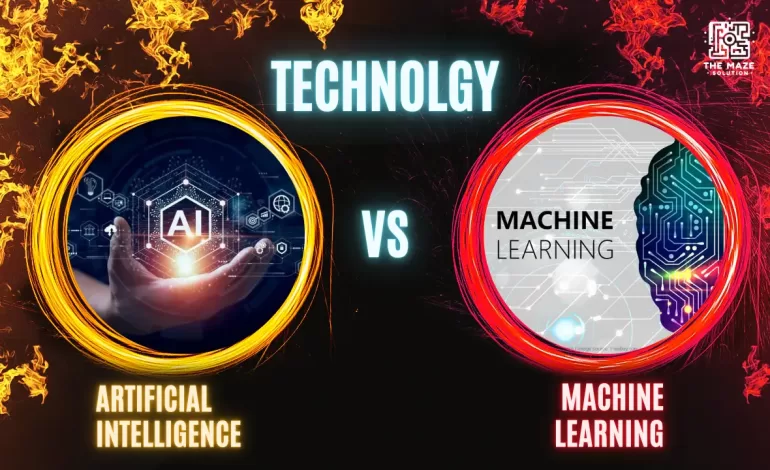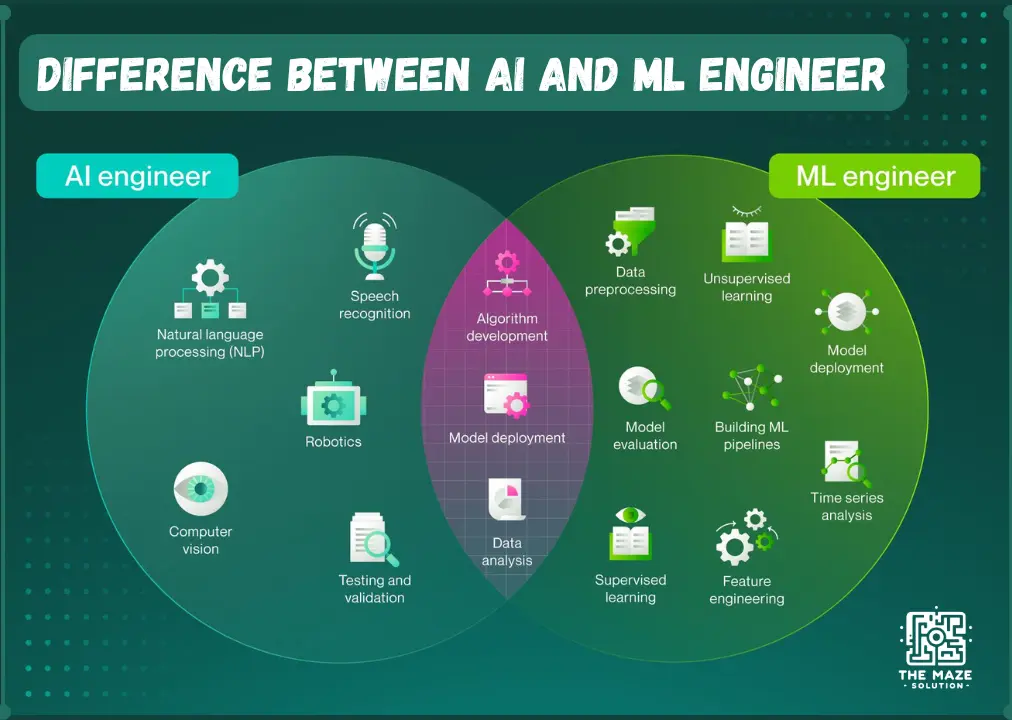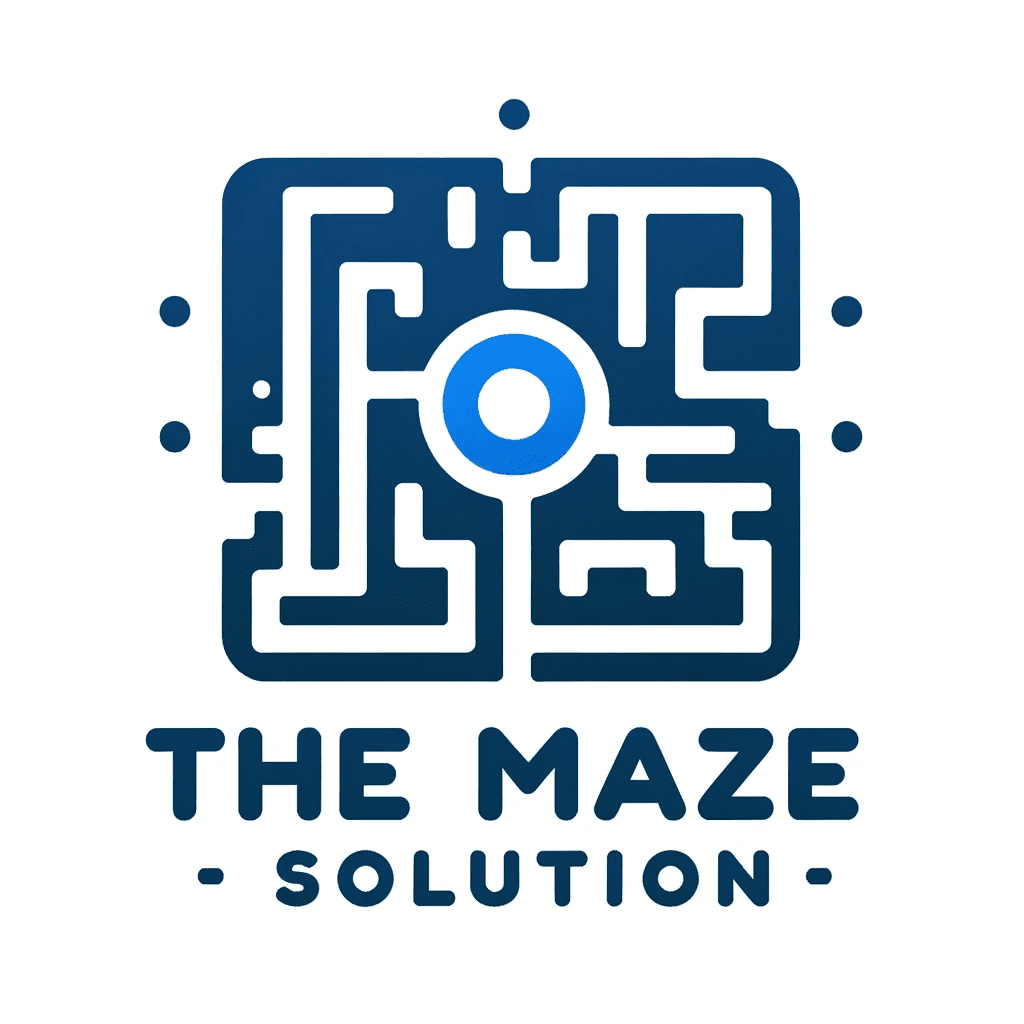AI Engineer vs ML Engineer: Key Differences, Career Paths, Salary Insights, and Industry Applications You Need to Know

Introduction
In today’s tech-driven world, the fields of Artificial Intelligence (AI) and Machine Learning (ML) are advancing rapidly, making them popular career paths for aspiring engineers. Understanding the differences between an AI Engineer vs ML Engineer is crucial for anyone looking to enter these dynamic fields. This blog post aims to clarify the distinct roles, career trajectories, salary expectations, and industry applications of AI Engineers and ML Engineers, providing valuable insights for tech enthusiasts, engineering students, HR professionals, and educators.
Understanding AI and ML Engineering
Both AI and ML Engineering play vital roles in technological innovation, but they focus on different aspects. AI Engineering involves creating systems that can simulate human intelligence processes, such as reasoning and learning. These engineers develop algorithms that enable machines to perform tasks like language translation and problem-solving. On the other hand, ML Engineering is a subset of AI that focuses on designing systems that learn from data. ML Engineers create models that improve over time, automating decision-making processes.
The core difference between AI and ML Engineering lies in their objectives. AI Engineers work on broader projects that mimic human intelligence, while ML Engineers specialize in developing models that learn and improve without explicit programming. Understanding these roles helps in choosing the right path depending on your career interests.
Key Responsibilities and Skill Sets
AI Engineers are responsible for designing and implementing AI models that can perform complex tasks. They work with neural networks and deep learning technologies to build systems capable of self-learning and adaptation. Their work often involves natural language processing, robotics, and computer vision.
ML Engineers focus on developing and fine-tuning machine learning models. They handle large datasets, perform feature engineering, and optimize models for accuracy and efficiency. Their responsibilities include selecting appropriate algorithms, evaluating model performance, and deploying models into production environments.
While both roles require strong programming skills, AI Engineers often need expertise in AI-specific tools like TensorFlow and PyTorch, while ML Engineers require proficiency in statistical modeling and data analysis techniques. Understanding these distinctions helps in deciding where your skills might fit best.
Educational Requirements and Qualifications
For those aspiring to be AI Engineers, a bachelor’s degree in computer science, engineering, or a related field is typically required, with advanced degrees in AI or data science being highly recommended. Certifications in AI-related technologies can also bolster your qualifications.
Similarly, ML Engineers often hold degrees in computer science, mathematics, or statistics. Specialized courses in data science, machine learning, and programming languages are advantageous. Both roles benefit from online resources and certifications in popular tools and frameworks.
The qualifications for AI and ML Engineers overlap significantly, but the key difference lies in specialized skill sets and expertise in specific technological areas. Exploring educational pathways and resources helps in building a strong foundation for a successful career in either field.
AI Engineer vs ML Engineer

Machine Learning vs Artificial Intelligence Jobs
The demand for AI Engineers continues to grow, with opportunities across various industries such as healthcare, finance, and automotive. Companies seek AI expertise to develop smart applications and automate processes, offering promising career prospects for AI professionals.
Similarly, ML Engineers have a wide range of career opportunities, with industries increasingly adopting machine learning solutions to enhance decision-making and operational efficiency. From startups to tech giants, the demand for skilled ML Engineers is on the rise.
Transitioning between AI and ML roles is possible, although it requires adapting to different skill sets and responsibilities. Understanding the diverse opportunities and challenges in each role can guide you in planning your career trajectory effectively.
AI vs ML Salary Comparison
AI vs ML salary comparison vary by region and experience level, with average ranges typically higher due to the specialized nature of the work. Locations like Silicon Valley and New York City offer some of the highest compensation for AI professionals.
ML Engineers also enjoy competitive salaries, with compensation depending on factors such as industry, location, and expertise. In general, AI roles tend to command slightly higher salaries due to the broader skill requirements and complexity of AI projects.
Understanding the AI vs ML salary comparison landscape helps in setting realistic expectations and making informed decisions about which path to pursue based on financial goals and career ambitions.
AI and ML Applications in Industry
AI and ML applications in industry are revolutionizing a wide range of industries by enhancing efficiency and driving productivity. Here’s how these technologies are being applied across different sectors:
Healthcare
In the healthcare industry, AI and ML applications in industry are transforming patient care. AI algorithms analyze vast datasets to predict patient outcomes, allowing for more personalized treatment plans. Machine learning, on the other hand, aids in diagnosing diseases by recognizing complex patterns in medical images and data.
Finance
The finance sector has seen significant advancements through AI and ML applications in industry .AI systems are employed to detect fraudulent activities with precision and speed, while automated trading platforms leverage AI to make real-time decisions. In addition, machine learning improves credit risk assessments by analyzing customer data and trends, thus enhancing overall customer service.
Automotive
AI and ML applications in industry are at the forefront of innovations in the automotive industry. These technologies are critical in developing autonomous vehicles, which rely on continuous learning from the environment to make driving decisions. Additionally, AI enhances safety features, making vehicles smarter and safer for consumers.
The Impact and Importance
The applications of AI and ML in these industries underscore their profound impact. They not only improve operational efficiencies but also open up new opportunities for innovation. Skilled professionals equipped with knowledge in AI and ML are essential in driving this technological growth and ensuring that businesses remain competitive in an evolving landscape.
Understanding these applications helps industry professionals, technology enthusiasts, and decision-makers appreciate the importance of integrating AI and ML into their operations. This integration is not just beneficial but essential for future-proofing industry practices and maintaining a competitive edge.
Tools and Technologies in AI and ML Engineering
In the rapidly evolving fields of Artificial Intelligence (AI) and Machine Learning (ML), engineers leverage a variety of tools and technologies to develop, deploy, and optimize models. Whether you’re an industry professional, a tech enthusiast, or a decision-maker, understanding these tools can significantly enhance your approach to AI and ML projects.
AI Engineers
Key Tools:
- TensorFlow: An open-source platform developed by Google, TensorFlow is renowned for its flexibility and scalability. It supports complex neural networks and is particularly useful for large-scale projects that require significant computational power.
- PyTorch: Developed by Facebook’s AI Research lab, PyTorch is another leading framework known for its dynamic computation graph, which allows for greater flexibility and ease of use. Its simplicity makes it a favorite among researchers and developers who need to iterate quickly.
AI engineers often use these frameworks to build sophisticated models capable of learning from vast datasets, making them indispensable for tasks such as image recognition, natural language processing, and autonomous systems.
ML Engineers
Essential Libraries:
- Scikit-learn: This library is a staple for ML engineers due to its simple and efficient tools for data mining and data analysis. Scikit-learn provides a range of supervised and unsupervised learning algorithms via a consistent interface in Python.
- Keras: Known for its user-friendly API, Keras facilitates fast experimentation with deep learning models. It’s typically used as an interface for TensorFlow, providing high-level building blocks for developing deep learning models.
These tools are essential for ML engineers focused on model development and evaluation. They streamline the machine learning workflow, enabling engineers to experiment with different models and quickly transition to production deployment.
Importance of the Technological Stack
For any aspiring AI or ML engineer, understanding the technological stack is crucial. This knowledge helps in selecting the appropriate tools that align with your project goals and resource availability. It also guides skill development, ensuring that you are well-equipped to tackle both current and future industry challenges.
Keeping up-to-date with advancements in AI and ML technologies not only enhances your technical capabilities but also positions you as a forward-thinking professional in a competitive landscape.
The Future of AI and ML Engineering
The future of AI and ML applications in industry is marked by rapid advancements and evolving technologies. Innovations in areas like reinforcement learning and generative models are expected to redefine existing applications and introduce new possibilities.
The next decade will likely see increased collaboration between AI and ML engineers, as interdisciplinary approaches become more prevalent in solving complex problems. Staying informed about emerging trends and technologies ensures that professionals remain competitive and adaptable to industry changes.
Anticipating these developments allows aspiring engineers to prepare for future challenges and seize opportunities in the fast-paced world of AI and ML.
Conclusion
In conclusion, understanding the differences between AI and ML engineers is essential for anyone considering a career in these fields. By exploring their distinct roles, responsibilities, and industry applications, you can make informed decisions about which path aligns with your interests and goals.
We encourage you to stay updated on industry trends and continuously seek opportunities for learning and growth. With the right skills and mindset, you can thrive in the dynamic landscape of AI and ML engineering.
For further insights and resources, feel free to explore additional articles and engage with our community. Your thoughts and experiences are valuable, and we invite you to share them in the comments below.
What is the main difference between an AI Engineer and an ML Engineer?
AI Engineers focus on developing systems that simulate human intelligence, while ML Engineers specialize in creating models that enable machines to learn from data.
What skills are required to become an AI Engineer?
AI Engineers need strong programming skills, knowledge of algorithms and data structures, experience with AI frameworks, and expertise in neural networks and deep learning.
Which role has a higher salary: AI Engineer or ML Engineer?
Salaries can vary depending on experience, location, and the specific company, but AI Engineers often command slightly higher salaries due to the broader scope of their work.





